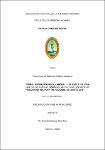Perfil socioeconómico, laboral y de estilo de vida que se asocian al Síndrome de Burnout en médicos residentes del Hospital Regional de Loreto 2018
Abstract
Introducción: El Síndrome de Burnout es el resultado de un estrés crónico, el
estrés es un fenómeno resultante de la relación entre la persona y los eventos
de su medio, que son evaluados como amenazantes para sus recursos y
pueden poner en riesgo su bienestar. Factores como deficientes estrategias
educativas durante el residentado, y el estilo de vida del residente exponen a
estos sujetos a un estrés crónico, constituyéndose en un grupo de riesgo para
desarrollar síndrome de desgaste laboral.
Objetivo: Estimar el perfil socioeconómico, laboral y de estilo de vida que se
asocian al Síndrome de Burnout en médicos residentes del Hospital Regional
de Loreto 2018
Materiales y Métodos: Estudio analítico, transversal de datos estadísticos de
encuestas realizadas en el Hospital Regional de Loreto en el año 2018. Se
trabajó con la población total de residentes, la cual constó con 55 médicos
residentes. La información se manejó y almacenó en una base de datos creada
en el paquete de hoja de cálculo de Microsoft Excel y el análisis estadístico se
realizó y evaluó con el paquete estadístico Stata V14.
Resultados: La muestra estuvo conformada por 50 médicos residentes que
cumplieron la muestra de inclusión. La prevalencia del SBO encontrada fue del
40%. El Síndrome de Burnout se relaciona significativamente con el consumo
de cigarrillos (OR 4.2, P= 0.029) y el mayor número de guardias (OR 1.3,
P=0.036), medida por regresión logística.
Conclusiones: Los residentes tienen en promedio 34 años, y el 80% son de sexo
masculino. El área más afectada del Síndrome de Burnout en los residentes fue el
desgaste emocional (96%).El Síndrome de Burnout se relaciona significativamente
con el consumo de cigarrillos y el mayor número de guardias. Introduction: The Burnout Syndrome is the result of chronic stress, stress is a
phenomenon resulting from the relationship between the person and the events
of their environment, which are assessed as threatening to their resources and
can put their well-being at risk. Factors such as poor educational strategies
during residency, and the lifestyle of the resident expose these subjects to
chronic stress, constituting a risk group to develop burnout syndrome.
Objective: To estimate the socio-economic, occupational and lifestyle profile
associated with the Burnout Syndrome in physicians of the Loreto Regional
Hospital 2018.
Materials and Methods: Analytical, cross-sectional study of statistical data
from surveys conducted at the Regional Hospital of Loreto in 2018. The total
population of residents was worked with, which consisted of 55 resident
physicians. The information was managed and stored in a database created in
the Microsoft Excel spreadsheet package and the statistical analysis was
performed and evaluated with the statistical package Stata V14.
Results: The sample consisted of 50 resident doctors who met the inclusion
sample. The prevalence of Burnout Syndrome was 40%. The Burnout Syndrome is
significantly related to cigarette consumption (OR 4.2, P = 0.029) and the highest
number of guards (OR 1.3, P = 0.036), measured by logistic regression.
Conclusions: The residents have an average of 34 years, and 80% are male.
The most affected area of the Burnout Syndrome in the residents was the
emotional exhaustion (96%). The Burnout Syndrome is significantly related to
the consumption of cigarettes and the greater number of guards.
Collections
- Tesis [368]
The following license files are associated with this item:


